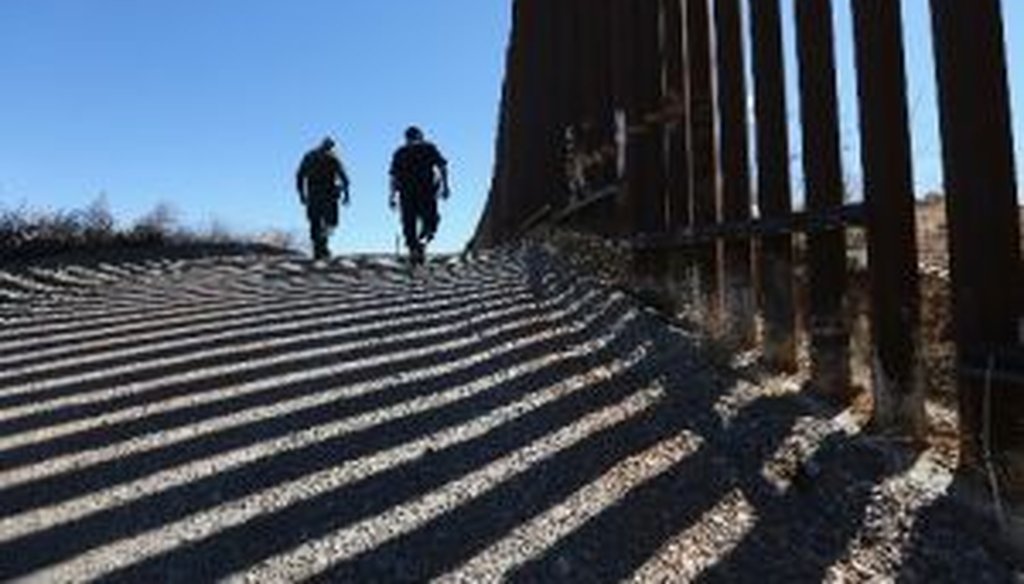Stand up for the facts!
Our only agenda is to publish the truth so you can be an informed participant in democracy.
We need your help.
I would like to contribute

U.S. Customs and Border Protection personnel walk along a section of recently-constructed fence on the U.S.-Mexico border near Nogales, Ariz.
From fence opt-out clauses to free phones for immigrants, PolitiFact has tracked the rhetoric of the immigration debate — and heard plenty of falsehoods.
With a bill now heading to the House, we decided to recap PolitiFact’s top five falsehoods in the immigration debate.
1986 amnesty assured Obama’s re-election? A popular line of attack for the Senate bill is that it’ll be 1986 all over again — amnesty for illegal immigrants, without enforcement to prevent a new wave of people crossing the southwestern border. U.S. Rep. Steve King, R-Iowa, went a step further, claiming President Ronald Reagan shaped the nation’s electoral future.
"Reagan’s signature on the 1986 amnesty act brought about Barack Obama’s election," King said. The Immigration Reform and Control Act resulted in permanent legal status for about 2.7 million immigrants. King argued that resulted in nearly 13 million votes for Obama, more than twice his margin of victory.
But King’s math missed the mark. Many of the newly legal residents did not become citizens, and thus never earned the right to vote. Also, King didn’t account for low rates of voter participation among Hispanics who do have that right. And most important, his estimate of family members receiving legal status for every case of amnesty under the 1986 law was wildly high. We calculated the law, instead, may have added 300,000 to 600,000 votes for Obama — and rated King’s claim False.
Border security "designed never to come into being"? Sen. Ted Cruz, R-Texas, warned that the Senate bill "has immediate legalization ... and the border security is sometime in the future, and just like in 1986, it's designed never to come into being." He was right that immigrants in the country illegally could soon qualify for a provisional legal status — though permanent legal status hinges on a series of triggers, from border security to employment enforcement.
But he overlooked much stronger support for border security in the current legislation, including appropriation of more than $46 billion, available immediately. (The 1986 law merely authorized security spending, but didn’t appropriate it.) We rated his claim Mostly False.
An optional border fence? Sen. Jeff Sessions, R-Ala., called security measures in the bill, such as a requirement for at least 700 miles of pedestrian fencing along the southwestern border, "a mere promise." In fact, he told CBS News, the bill would allow Obama’s Homeland Security secretary to just say no.
He explained the bill "has a specific provision that says that Secretary (Janet) Napolitano does not have to build any fence if she chooses not to."
We checked out that "specific provision," and attorneys told us it actually just gives Napolitano discretion about where to build 700 miles of fence along the nearly 2,000-mile border. It doesn't give her a choice not to build at all. We rated Sessions’ claim False.
Free cell phones for illegal immigrants? Bloggers claimed the Senate bill would grant immigrants with work visas their own taxpayer-funded cell phones. (Dubbed, of course, "MarcoPhones," after Florida Sen. Marco Rubio, one of the the bill’s Republican sponsors.) One quick clue that the rumor was off-base: The section that allegedly authorized the free phones, Section 1107, was part of the bill’s Title I, which had to do with border security.
The bill included grants aimed at helping American ranchers and others at risk of remote border violence get satellite phone service so they could be in touch with authorities. And Rubio could point to a well-documented case in which a rancher was killed on his property. We rated the claim False.
Free cars for teenagers? Bloggers (again) promoted the absurd notion that teenagers would get free cars — or motorcycles or scooters or other vehicles — under the immigration law. In reality, the Senate bill included a provision for a youth jobs program with transportation services. Typically, that means bus passes. Given the program's safeguards, the idea that the administration would give away free cars was laughable. We rated this statement Pants on Fire.
Want more? Read all our fact-checks on immigration.
Our Sources
See original stories



















































